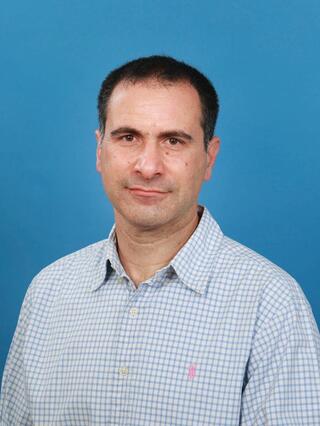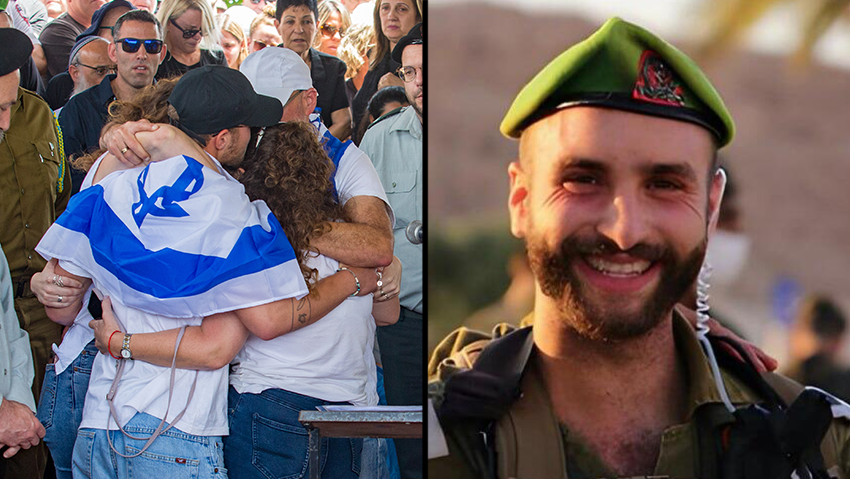Getting your Trinity Audio player ready...
While the family of the late Major (res.) Dor Zimel, who was killed by Hezbollah's attack on Arab al-Aramshe, buried their loved one on Monday at the Even Yehuda cemetery, Kfir Zer, 24, from Sderot, received his lungs which saved his life. Kfir was injured about four months ago in Khan Younis.
Major Zimel fought for his life for five days after being injured on Wednesday by a missile in Arab al-Aramshe on the Lebanese border. Just moments before the doctors performed the lung transplant surgery on Kfir at 3:30 a.m., he had one request from his family: to attend Zimel's funeral and pay their respects.
"We have been hospitalized for three weeks now since Kfir was injured four months ago in Khan Younis," says Yosef Zer, Kfir's father, married and father to a daughter. "He was treated for three weeks at Soroka and later transferred to Shamir Medical Center, where he was treated in a decompression chamber due to a fungal infection. He survived it, but his lungs did not recover from the injury."
"His condition deteriorated until it was decided to transplant lungs. He was connected to an ECMO machine (which simulates heart-lung function) for weeks. We moved to Sheba and waited for a lung transplantation. on Sunday, they informed us that a suitable donor was found. During this period, Kfir was conscious, ate, drank - but could not get out of bed."
"When they informed us (about the lung donation), he was very happy. It was a very difficult period for us. Waiting for someone else's tragedy for our miracle and blessing for us. At one in the morning, a hospital team went to bring the lungs, and at half-past-three, he was taken to the operating room for the lung transplant," Yosef recounted. According to Zer, "Before they prepared him for surgery, the whole family was with him and supported him. His request was for us to attend the funeral. Since the holiday also postpones the shiva, the most suitable thing was to be at the funeral."
The entire family gathered and paid their respects to the Zimel family in their presence. During the funeral, Kfir was in surgery. "On the one hand, our family honored him, and at the same time, I was in the hospital, and the doctors said, thank God, the surgery was successful. The feelings are joyful because the surgery succeeded. A person selflessly donated a lung and gave another person his life. When my wife and the rest of the family returned from the funeral, they said they stood aside and understood that it was time for the family to say goodbye to Dor. We wanted to honor him just by being there."
Kfir's mother approached Dor's mother, hugged her, sympathized with her, and said that at this moment her son was receiving Dor's lungs. "We are currently in the process of starting a very long recovery and rehabilitation. Kfir needs to undergo lung and limb injury rehabilitation. After four months of lying down, he has a lot of physical therapy, so it's a very long process. I believe that when he comes out of here, he will want to go and personally thank Dor's parents," he said.
The wounded soldier's father has a message for everyone on the eve of Passover: "It's important that people get an organ donor card. Kfir's small redemption on the eve of Passover connects to the general redemption of the entire people of Israel."
The night fluctuated between pain and optimism
At Sheba, they mentioned the dedicated treatment Zer received at Soroka and Assaf HaRofeh hospitals. The medical team from Sheba Hospital arrived to perform the transplant surgery, the second ever performed on wounded soldiers. According to Dr. Liran Levy, Medical Director of the Sheba Lung Transplant Program,
"This is the second case of lung transplantation in wounded soldiers in the world, as far as we know. Usually, people who were injured in combat with a lung injury as severe as theirs would have died on the way to the hospital and not survived. Since COVID, we have been treating people with ECMO and have learned its capabilities, having improved ourselves, leaving people alive, and using ECMO as a bridge to recovery on the way to a lung transplant.
 Dr. Liran LevyPhoto: Sheba Hospital
Dr. Liran LevyPhoto: Sheba Hospital"It is necessary to emphasize that both cases are people who were injured some time ago. In other words, they were given a lot of time to recover. The expectation was that their lungs would improve, but it simply didn't happen. This is a new and original step that expands the possibility of a transplant," he said.
"On Sunday we received the news that there is a donor and that it is a soldier who was killed by the missile attack. We do not usually provide details to the families about the donor, especially in cases like these, which are difficult for the receiving family. We try not to burden them emotionally. We received the news and updated the family, but the family made the connection by themselves, especially after it was published that Dor Zimel's family decided to donate his organs," he added.
Dr. Levy added: "I am not aware at the moment of any other soldiers supposed to undergo lung transplant surgery, but we do know that there is a lung injury resulting from exposure to smoke and blast injury. There is also a difference in the nature of the lung injury of the soldiers who underwent a transplant, and I really think it is very important to investigate this issue of lung injuries in soldiers injured in combat."
"During the late-night efforts, the medical teams traveled to collect organs from the Galilee Medical Center in Nahariya and returned to Sheba in the morning. The transplant, which lasted several hours, went smoothly without any unusual events."
On the eve of Passover, alongside the hole in the heart and the empty chair for the fallen, comes the news that we saved another life in Israel
"In every transplant like this, dozens of staff members participate, from the laboratory, blood bank, nursing staff, perfusionists (responsible for heart/lung bypass equipment in heart/lung surgeries), anesthesiologists, cardiologists, heart surgeons, and more. In every transplant, we see the new lives given to the patient, but we can never ignore the story behind the lungs. It was a night fluctuating between a lot of pain and optimism. We've been on this path for several good months. On the eve of Passover, alongside the hole in the heart and the empty chair for the fallen, comes the news that we saved another life in Israel."
In his death, Dor Zimel, may his memory be a blessing, saved seven people with his organs. His heart was transplanted into a 57-year-old man at Beilinson Hospital, his lungs into Kfir, his liver and kidney into a 68-year-old man at Hadassah, a kidney into an eight-month-old baby at Schneider, and another kidney into a 58-year-old man at Beilinson. He will always be remembered.





